

History of Bread and Puppet Theatre. The 1960s saw a new development in experimental theatre: theatre of protest.
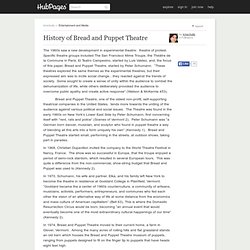
Specific theatre groups included The San Francisco Mime Troupe, the Théâtre de la Commune in Paris, El Teatro Campesino, started by Luis Valdez, and, the focus of this paper, Bread and Puppet Theatre, started by Peter Schumann. “These theatres explored the same themes as the experimental theatres, but their expressed aim was to incite social change…they reacted against the trends of society. Some sought to create a sense of unity within the audience to combat the dehumanization of life, while others deliberately provoked the audience to overcome public apathy and create active response” (Watson & McKernie 453).
Questioning Myths: Bread & Puppet Theater’s Peter Schumann. Goddard College President Barbara Vacarr withBread & Puppet Theater founder Peter SchumannCourtesy of Goddard College On Sunday, July 22, 2012, Goddard College in Plainfield, Vermont, bestowed its Second Annual Presidential Award for Activism to Bread & Puppet Theater founder and artistic director Peter Schumann as part of the commencement for the MFA in Interdisciplinary Arts.
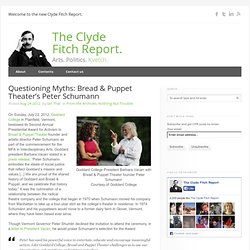
Goddard president Barbara Vacarr stated in a press release, “Peter Schumann embodies the ideals of social justice that reflect Goddard’s mission and values [...] Notes on gesture. Giorgio Agamben.pdf by Signos Salvajes Signos Salvajes. London Theatre Blog. An Introduction to Brechtian Theatre. Plato's Aesthetics. 1.
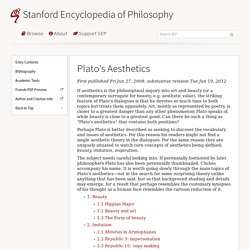
Beauty The study of Plato's account of beauty must begin with one pronounced warning about terminology. The Greek adjective kalon only approximates to the English “beautiful,” so that not everything Plato says about a kalon thing will belong in a summary of his aesthetic theories. Readers can take this distinction between the Greek and English terms too far. It is more tempting to argue against equating words from different languages than to insist on treating them interchangeably.
But even given these qualifications the reader should know how to tell what is beautiful from what is kalon. More typically kalon appears in contexts to which “beautiful” would fit awkwardly or not at all. Because kalon does not always apply when “beautiful” does, and conversely much can be kalon that no one calls beautiful, translators may use other words. The telling criterion will be not philological but philosophical. 1.1 Hippias Major After Hippias fails, Socrates tries out three definitions. 2. 3.
C:\1heid\47PLATO.PDF - Heidegger_on_Being_in_the_Cave_of_Plato.pdf. Essay on Mimetic Desire in Shakespeare. Essay on Mimetic Desire in Shakespeare.

Shakespeare and Mimesis <i>A New Mimesis: Shakespeare and the Representation of Reality</i> by A. D. Nuttall <i>Shakespeare the Thinker</i> by A. D. Nuttall. Advanced Search. Beyond universalism and particularism: rethinking contemporary welfare theory. Current debates about the respective merits of universalist and particularist approaches to welfare suggest that contemporary welfare theory has reached an impasse.
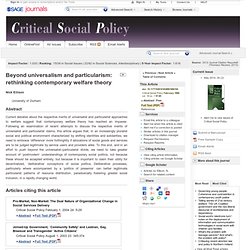
Following an examination of recent attempts to discuss the respective merits of universalist and particularist claims, this article argues that, in an increasingly pluralist social and political environment characterized by shifting identities and solidarities, we need to embrace ‘difference’ more forthrightly if allocations of social goods and services are to be judged legitimate by service users and providers alike. To this end, and in an effort to push beyond the universalist–particularist divide, we need to take greater account of ‘postmodern’ understandings of contemporary social politics, not because these should be accepted entirely, but because it is important to claim their utility for decentralized, ‘deliberative’ conceptions of social politics.
4. The Particularism-Universalism Problematic: Relativism and the Decentred Subject. The trajectory of the particularism-universalism problematic is a complex one.
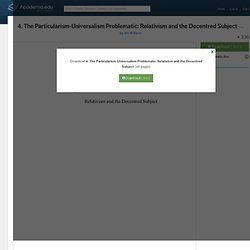
Thisis illustrated by the seemingly intractable problem of how to determine the extent to whichthe particular and the universal imply one another. The question of how anti-universalismshould be conceived in the context of establishing a valid politics of ‘identity’ is also arecurrent theme in postmodernist thought. The Role of Mimesis in Aristotle’s Poetics: A Fundamental Cognitive System. The Chicago School of Media Theory. Imitation. Imitation is an advanced behavior whereby an individual observes and replicates another's behavior.

Imitation is also a form of social learning that leads to the "development of traditions, and ultimately our culture. It allows for the transfer of information (behaviours, customs, etc.) between individuals and down generations without the need for genetic inheritance. "[1] The word imitation can be applied in many contexts, ranging from animal training to international politics.[2] Anthropology and social sciences[edit] In anthropology, some theories hold that all cultures imitate ideas from one or a few original cultures, the Adam of the Bible, or several cultures whose influence overlaps geographically.
Scholars[3] as well as popular authors[4][5] have argued that the role of imitation in humans is unique among animals. In the mid-20th century, social scientists began to study how and why people imitate ideas. Neuroscience[edit] Neurologist V.S. Mirror Neuron System[edit] Theories[edit] From Mimesis to "Aristotle for Screenwriters"